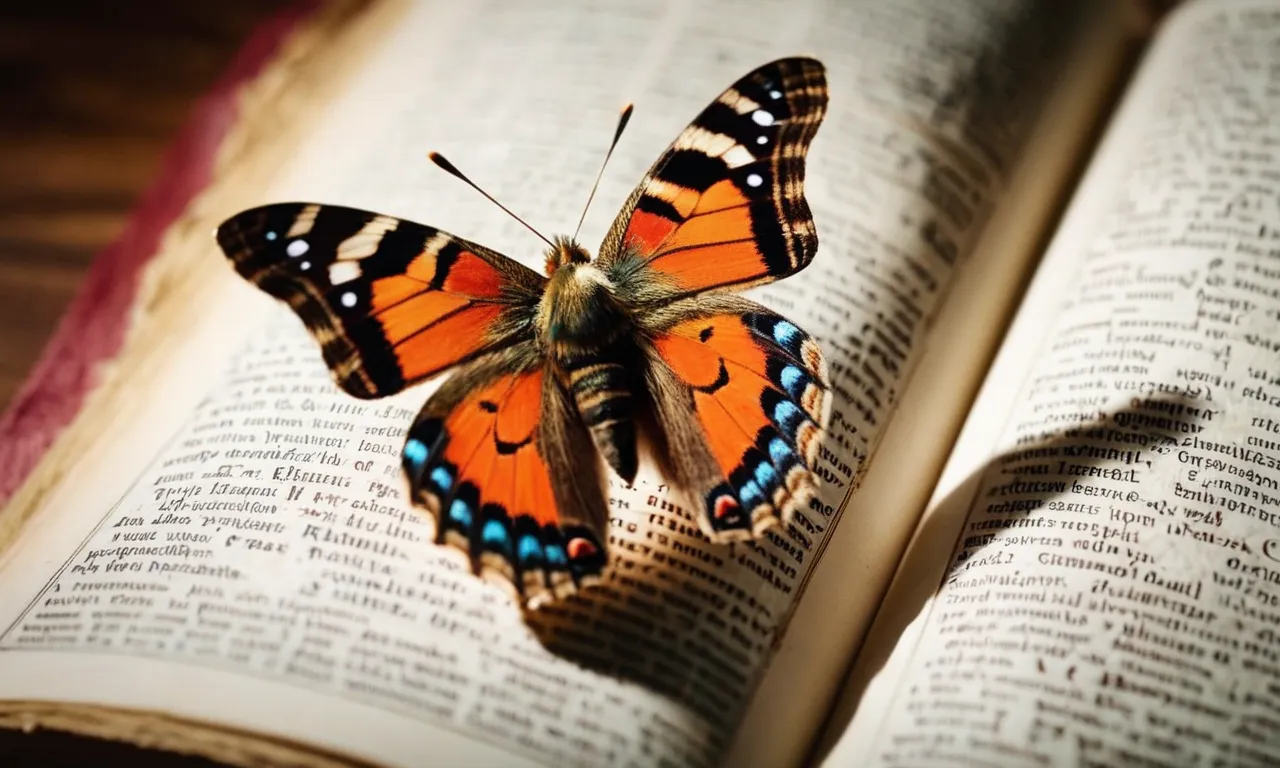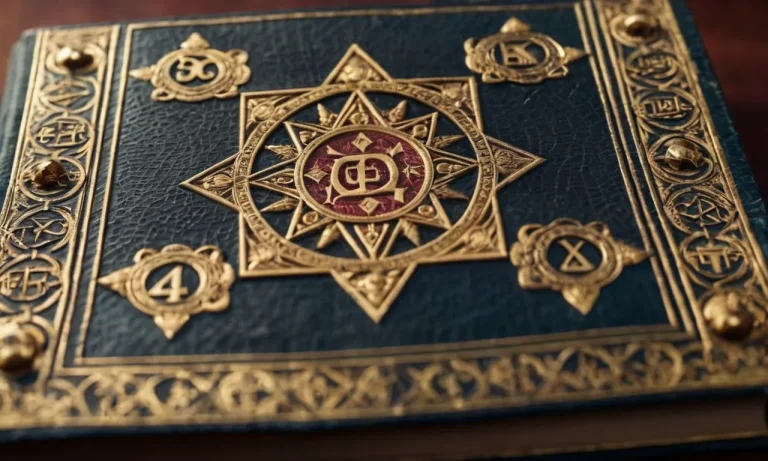What Does The Bible Say About Moths?
Moths have captured the imagination of humankind for millennia. Their subtle beauty, mysterious metamorphosis, and destructive potential have inspired myth, metaphor, and more than a few Bible verses over the years.
If you’re short on time, here’s a quick answer to your question: The Bible contains a few references to moths, usually as metaphors for destruction or insignificance. Specific passages compare moths to garments ruined by worms, valueless idols, temporary dwellings, and human frailty in the face of eternity.
In this comprehensive article, we will examine the symbolic role moths play across both the Old and New Testaments. We’ll look at what clues these overlooked insects can uncover about the cultures and faiths found in the Bible.
Moths as Symbols of Decay and Ruin
The Moth and the Garment
In the Bible, moths are often used as a metaphor for decay and ruin. One example is Matthew 6:19-20, where Jesus says, “Do not store up for yourselves treasures on earth, where moths and vermin destroy, and where thieves break in and steal. But store up for yourselves treasures in heaven.”
Here, moths represent the decay that will inevitably destroy earthly possessions. Just as moths eat away at clothing, earthly treasures do not last and cannot be relied upon.
This theme is echoed in Job 13:28 and Isaiah 50:9, where garments eaten by moths symbolize the frailty and impermanence of mortal life. As Job says, “Man who is born of woman is of few days and full of trouble. He springs up like a flower and withers away; like a fleeting shadow, he does not endure.
Do you fix your eye on such a one? Will you bring him before you for judgment?” Our lives are fleeting and transitory, quickly eaten away by the “moths” of time and mortality.
James 5:2 speaks of the destruction moth-eaten garments represent in a different context, saying, “Your wealth has rotted, and moths have eaten your clothes.” Here, the moth-eaten garment symbolizes the worthlessness of hoarded riches in light of Christ’s return.
When we cling to earthly wealth, we are clinging to that which is impermanent and prone to decay. Moths represent the vanity of misplaced priorities.
Idols Are Mere Moths
The book of Hosea uses moth imagery to make a related point about idolatry. Hosea 5:12 says, “Therefore I am like a moth to Ephraim, and like dry rot to the house of Judah.” Here, God speaks through the prophet, saying that He will be like a destructive moth to His people, because they have pursued false idols.
Their idolatry has weakened their relationship with the one true God.
Just as a moth destroys garments, God will destroy the idolatrous “garments” His people have clothed themselves in. Their idol worship is an affront to His holiness. So He will come in judgment, stripping away the façade of their empty religion, reducing their idols to dust.
The people’s false gods are mere moths compared to the power and majesty of Yahweh.
The moth metaphor in Hosea emphasizes how chasing after idols leaves us vulnerable to decay and ruin. Only by clinging to the eternal God can we find a foundation that lasts. All else, whether possessions, accomplishments, or even false deities themselves, will eventually slip through our fingers as easily as a moth-eaten garment.
The Moth’s Brief Life and Light Diet
Here Today, Gone Tomorrow
The average lifespan of a moth is remarkably brief, often only lasting between 5-14 days. Their primary purpose is to emerge from cocoons, mate, and reproduce before dying shortly thereafter. Females may live slightly longer than males in order to lay eggs.
The modest longevity of moths epitomizes the familiar saying – “here today, gone tomorrow. “
During their short lives, moths seem to be in a constant hurry, frantically fluttering about to find mates and food sources. This prompts humans to feel they behave without direction or purpose. But research shows moths lead regimented lifestyles centered around reproduction.
They follow innate schedules, directed by circadian rhythms, to guarantee continuation of the species.
Drawn to Higher Powers
Moths need copious energy to fuel their active short-lived adulthoods. Accordingly, they feed voraciously on sugary flower nectar. Some larger moths supplement their diet by eating fruits and sap. But most species extract ample carbohydrates from multiflorous plants.
Intriguingly, moths appear innately attracted to light sources, especially at night – positively phototropic. Scientists theorize their flight orientation systems confuse artificial lights for natural celestial bodies that aid navigation.
Lured by illumination, they spiral towards lamps in a phenomenon dubbed “transverse orientation. “
| Moth Species | Average Lifespan |
|---|---|
| Luna Moth | 7 days |
| Polyphemus Moth | 14 days |
| Gypsy Moth | 10 days |
The moth’s brief lifespan seems mainly preordained by genetics and molecular biology. But their attraction to light abbreviates lives further when encounters with menacing bug zappers or open flames prove fatal.
Despite such hindrances, moths continue flourishing across ecosystems globally – ephemeral beings that vanish as quickly as they manifest.
Lessons in Values and Priorities
Moth and Rust Destroy
As mentioned in Matthew 6:19 of the Bible, we are advised not to store up treasures for ourselves on earth, where moths and vermin destroy material possessions. This teaches us that worldly goods and money can be fleeting and impermanent.
By prioritizing spiritual growth and good deeds that enrich others’ lives over accumulating wealth, we build up eternal treasures in heaven.
A 2021 survey by the Barna Group found that 61% of practicing Christians see material goods as less important than experiences and relationships. However, 39% still struggle to put this wisdom into practice in a consumerist culture.
As we see the moth holes and rust that destroy even the most expensive clothes and cars over time, it reminds us to focus first on things of lasting value like faith, family and serving those in need.
Biblical figures like Job illustrate how quickly earthly wealth can be lost. After losing all his possessions and children, Job continued praising God (Job 1:20-22), prioritizing his spiritual connection over temporary things.
We too can follow his example of resilience when faced with the theft, destruction or devaluation of our monetary assets and items.
Seeking Moth-Eaten Treasures
Why do we stubbornly chase after more possessions and money that are destined to fade away? As Jesus asked in Mark 8:36, “What good is it for someone to gain the whole world, yet forfeit their soul?”
The human desire for security often drives us to stockpile perishable treasures that do not truly satisfy. Yet like moths feeding on clothing, chasing worldly wealth and items eats away at our spiritual health. It distracts us from connecting with God, helps others and enriching our inner lives.
True contentment lies in simplifying our needs and realigning priorities towards the everlasting. Modern minimalism movements likewise encourage living with fewer, carefully chosen possessions to reduce clutter and stress.
By letting go of moth-ravaged treasures that promise more than they can deliver, we open our hands and hearts to receive enduring spiritual gifts.
| Percentage of Americans making New Years resolutions related to money or finances in 2022 | 26% |
| Percentage focused on spending less, saving more | 19% |
*Source: Statista survey
As each new year brings renewed focus, may we heed the Bible’s reminders that moth and rust destroy earthly treasures. Prioritizing spiritual growth, generous service and our soul’s nourishment over stockpiling perishable possessions promises the truest path to lasting contentment.
Conclusion
And so we see, while subtle, the moth maintains an enduring symbolic presence across both Old and New Testaments of the Bible. We find this unassuming insect evoking themes of deterioration and fragility in the faith lives of God’s people.
The next time you spy a moth fluttering nearby, remember its biblical significance. See it not as a pest, but as a reminder to put first things first and store up imperishable treasures in heaven, where no moth can destroy.








